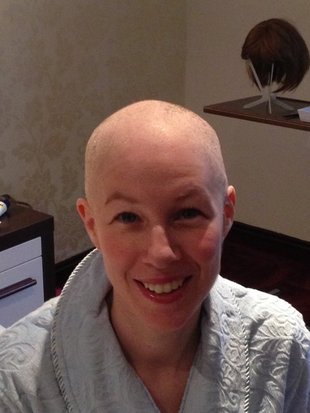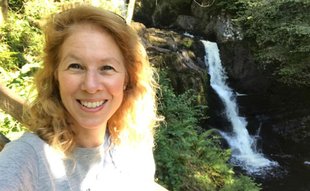Natalie Pearce: "Being aware of the faulty BRCA gene has helped my family"

Natalie
Natalie was diagnosed with Stage 3c ovarian cancer in November 2012, aged 40. Now, celebrating a decade since her diagnosis, she wants to share her story to give hope to anyone, especially with late stage ovarian cancer, who has just been diagnosed, or who is undergoing treatment.
"This photo still stops my heart. I remember how scared I was and how I was trying to put on a brave smile.
On my 40th birthday, I remember feeling healthy and happy, so the cancer diagnosis a few months later hit me with the force of a speeding train. I couldn’t believe that the symptoms I’d been experiencing for a few weeks could be a result of something as serious as cancer. I’d had bloating on and off for a few weeks, which was unusual, and my appetite had changed- I was feeling full quite quickly. When I started to get abdominal pain when I was lying on my side, I knew something wasn’t right. I saw my GP (it was a locum that day) and I felt that he was quite dismissive of my concerns, and suggested it was just IBS. He reluctantly agreed to send me for an ultrasound, but when I got home, I decided I didn’t want to wait, so I booked to have some private tests. I had googled my symptoms, and ovarian cancer was on the list, but I thought I was too young to have it.
The scans and tests showed a large mass on both ovaries, and it had spread outside the ovaries. I was absolutely shocked and terrified. My children were 10 and 12 at the time, and I couldn’t bear to think about how long I might have left, or whether I would see them grow up.
From the first appointment with my incredible consultant and his team at St James’s hospital in Leeds, I was given a lifeline to cling to. Dr Hall said he would get me back to how I was six months ago. It was the positive focus I needed to get me through the difficult journey I now faced. He also said that if he had a pound for every patient who said that chemo wasn’t as bad as they expected, he would be a very rich man!
I found that it really helped to have a sense of humour — trying scarves on before I lost my hair with my sister and Mum, who joked that I looked like Hilda Ogden from Corrie. I also made sure that on the good days, I went for a little walk or for lunch at our favourite veggie café. My wig was fantastic and gave me the confidence to go out and feel more normal, although in the house I preferred comfy beanie hats and wore them at night to keep my head warm.
After the first three lots of chemo and surgery, I was feeling very positive, because I responded really well to the chemo and my CA125 levels went down at every appointment.
My consultant had suggested I took part in a clinical trial for the last three lots of chemotherapy, meaning some of the chemo was given directly via a port into my abdomen. The trial nurses became almost like family — they were so caring and professional, and I managed to tolerate the drugs well. Finishing all the treatment brought mixed emotions; I was relieved I’d reached the end but it also hit home about what I had been through and how life had changed.
"My Ashkenazi Jewish background also contributed to my risk"

Natalie at a waterfall
There’s also a real fear when you finish treatment that the cancer will come back and this fear does lessen over time but it’s hard to adjust. I felt panic every time I had an ache or a twinge, and I went back for a few extra blood tests for reassurance, as well as the scheduled three, then six monthly ones! I went for a session of reiki at the Macmillan centre next to the hospital, and cried for the whole session! It was very cathartic and I recommend taking time for relaxation or counselling sessions as a bridge back to ‘normal’ life.
I had a genetic test and discovered I have the faulty BRCA1 gene, which explained why I’d got ovarian cancer at such a young age. It was a relief to know a reason, but also a worry because I still had a high risk of getting breast cancer. I was advised to wait a while (to check I didn’t get an ovarian cancer recurrence) and then have breast surgery. So in October 2014, I had a preventative double mastectomy and reconstruction. It all went well and I felt enormous relief that I had lowered my risk to less than the average population.
Being aware of the faulty BRCA gene has helped my family. My parents were tested for the genetic mutation, and it’s my Mum who has it and has passed it on. She had got to the age of 65 without getting cancer. She’s had her ovaries out and goes for breast screening. My brother and sister were tested and unfortunately they both also have the faulty gene. My sister has now had her ovaries out and had the same preventative breast surgery as me.
We spoke to our children, a son aged 17 and a daughter aged 19, about the genetic BRCA risk. They have been tested and my son doesn’t have it but my daughter does have the faulty gene. She has had counselling and will look at all the options at the right time. I was so moved and proud when she said, “Mum, I just feel lucky to know about it and be able to do something about it.”
The impact of a faulty BRCA gene really is much greater than you first realise. I also have cousins who have since been tested and taken preventative action, so hopefully there are members of my family who won’t get cancer now and have to go through what I did. My Ashkenazi Jewish background also contributed to my risk, as 1 in 40 have the faulty BRCA1 or BRCA2 gene as opposed to 1 in 800 in the general population.
I co-founded a group called BRCA Journey to help advise and support our local community, and it’s amazing to be able to make a difference and empower people.
It’s so important to raise awareness of the symptoms so that more women and doctors recognise them, and it can be diagnosed at an earlier stage. I know how lucky I am to be here and I really try to appreciate all the little things I took for granted before. I want other women to have the best care and treatment too, which is why I support Ovarian Cancer Action."
In Natalie's Name, discover your risk and take control of your future